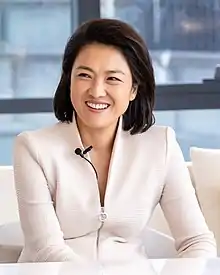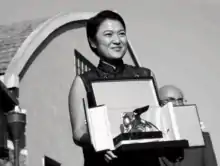Zhang Xin
Zhang Xin (simplified Chinese: 张欣; traditional Chinese: 張欣; pinyin: Zhāng Xīn, also known as Xin Zhang and Xin "Shynn" Zhang,[3] born 1965) is a Chinese billionaire businesswoman, having primarily earned her fortune in the real estate industry. With her husband Pan Shiyi, she is the co-founder and former CEO of SOHO China, a Chinese office building developer. She stepped down from the role of CEO on 7 September 2022 “in order to focus on supporting the arts and philanthropic pursuits.”[4][5][6]
Zhang Xin | |
|---|---|
 Zhang in 2019 | |
| Born | 24 August 1965 Beijing, China |
| Education | University of Sussex University of Cambridge[1] |
| Occupation(s) | Co-Founder, SOHO China[2] |
| Spouse | Pan Shiyi |
| Children | 2 |
| Website | www |
Raised in meager circumstances in Beijing and Hong Kong, where she was a factory worker for a time, Zhang eventually came to own companies responsible for dozens of real estate developments in Beijing and Shanghai. In the mid-2010s, Zhang began a transition from a business model of building and selling properties to one of buying and leasing them.[7] Zhang also acquired large stakes in New York City's Park Avenue Plaza and General Motors Building,[8][9][10][2] and launching the SOHO 3Q shared office space sector for this purpose in February 2015.[11] In 2014, Zhang was listed as the 62nd most powerful woman in the world by Forbes,[12] and is "regularly named one of the top businesswomen in the world."[2] Zhang and her husband were also previously ranked by Forbes among the "world's most powerful couples."[13] As one of China's best known female entrepreneurs, Zhang has an online following of 10 million on Sina Weibo.
Zhang and Pan founded the SOHO China Foundation in 2005 as a philanthropic organization to engage in education focused initiatives to alleviate poverty. In 2014, the Foundation launched the SOHO China Scholarships to provide financial aid to Chinese undergraduate students at leading international universities.[14] The SOHO China Scholarships support approximately 50 Chinese students pursuing undergraduate degrees at Harvard, Yale, and the University of Chicago.
Early life and education
In the 1950s, Zhang Xin's parents, second generation Burmese Chinese, left Burma and immigrated to China.[15][16][17] There, they worked as translators at the Foreign Languages Press.[18] They separated during the Cultural Revolution.
Born in Beijing in 1965, Zhang remained with her mother after the separation of her parents,[17] moving with her mother to Hong Kong at the age of 15,[2] where they lived in a room just big enough for two bunk beds.[17] To save for an education abroad, she worked for five years in small factories that made garment and electronic products.[19][2] By the age of 19, she had saved enough for airfare to London and to support herself for English study at a secretarial school in Oxford.[20] To support herself in the UK, she "worked in a traditional British fish and chip shop run by a Chinese couple," and took on Prime Minister Margaret Thatcher as a role model,[2] while also developing a "fascination with left-wing British intellectuals."[17]
In 1987, while still studying in London, she earned a scholarship that enabled her to begin studying economics at the University of Sussex, where she received a bachelor's degree.[17][2] In 1992, she graduated with a master's degree in development economics from Cambridge University,[21] where she wrote her master's thesis on privatization in China.[17] In 2013, Zhang received an honorary doctorate from the University of Sussex.[22]
Career
Initial investments
Upon graduation, Zhang was hired by Barings PLC (later Barings Bank), which had scouted Cambridge for students with knowledge of privatization in China, and which hired Zhang on the strength of her master's thesis on the topic.[17] She returned to Hong Kong to work, but in 1993, her unit at Barings was acquired by Goldman Sachs, and Zhang was transferred to New York City,[17] where she helped bring privatized Chinese factories to the public stock exchange.[2] Intrigued by China's burgeoning urbanization, she returned to her hometown, Beijing, where she met and married her husband—who purportedly proposed just four days after they met, in 1994.[2][18] In 1994, the couple began a mixed-use development project on unwanted land, called "New Town."[18]
She co-founded Hongshi (meaning Red Stone), which later became SOHO China, with her husband Pan Shiyi in 1995.[20] Over the next decade, they began six additional development projects in China, including a residential development in Boao, on the island of Hainan, and the Commune by the Great Wall, a managed boutique hotel in Beijing featuring the works of twelve Asian architects recruited by Zhang.[18][17] Early in their marriage and business relationship, the couple experienced friction due to differing ideas of how the business should be run, leading Zhang to return to England for a time to reflect.[2] Eventually, she decided to return to her husband, but left the business for a time, returning to focus on the design end when business increased.[2]
Later developments
Within 10 years after Zhang and Shiyi started their company, it was the largest property developer in the country, with Zhang known as "the woman who built Beijing".[2][23][24] By 2008, the couple was described by The Times as "China's most visible and flamboyant property tycoons."[18] In 2011, Zhang began to transition from merely developing and selling properties to buying and leasing space, and branched out of China by acquiring a $600 million stake in New York City's Park Avenue Plaza,[2] followed by participation in a group acquiring a 40 percent stake in the General Motors Building in midtown Manhattan in 2014,[10][2] for a reported $1.4 billion.[9] By that time, Zhang, through SOHO China, was involved in 18 developments in Beijing and 11 in Shanghai.[25]
In 2014, Zhang and her husband launched a $100 million charitable initiative, the SOHO China Scholarships, "to fund disadvantaged Chinese students at top institutions across the globe,"[10][14][2] including gifts of over $10 million to Yale University, over $15 million to Harvard University, and $10 million to the University of Chicago; the gifts engendered some controversy among critics who felt that the money could have been spent improving schools in China.[10] The SOHO China Scholarships support approximately 50 Chinese students pursuing undergraduate degrees at partner universities.[26]
SOHO China began a transition from a business model of building and selling properties to one of buying and leasing them,[7] with Zhang participating in the February 2015 launch of the SOHO 3Q shared office space sector, leasing shared space to companies in cities in China.[11]
Zhang moved to the United States during the COVID-19 pandemic and resigned from SOHO China in September 2022.[27]
Recognition

Zhang has received international awards for her role as an architectural patron in China and as an entrepreneur.[2] In 2002, she was awarded a special prize at the 8th la Biennale di Venezia for Commune by the Great Wall, a private collection of architecture, now a hotel.[2]
Zhang is a member of World Economic Forum, Davos and a board member of the Harvard Global Advisory Council.[28] She served as a trustee to the China Institute in America from 2005 to 2010, and was recognized by the China Institute with a Blue Cloud Award in 2010.[29] In 2014, Zhang was listed as the 62nd most powerful woman in the world by Forbes.[12] and is "regularly named one of the top businesswomen in the world."[2] Zhang and her husband have also been ranked by Forbes among the "world's most powerful couples."[13] Zhang has been named a trustee of the Museum of Modern Art[30] and of the Asia Business Council.[31]
Zhang made a cameo appearance, as a representative of a Chinese investor, in the 2010 film Wall Street: Money Never Sleeps.[32]
Personal life
Zhang and Pan have two sons.[10][18] They are members of the Baháʼí Faith.[33][34]
References
- "BBC Radio 4 profile of Zhang Xin by Justin Bolby". BBC. 17 March 2013.
- "Zhang Xin: The woman who built Beijing". CNBC. Retrieved 16 May 2018.
- "Jennifer Garner, Bumble Founder and C.E.O. Whitney Wolfe Herd, and theSkimm Co-Founders Danielle Weisberg and Carly Zakin to Speak at Vanity Fair's Second Annual Founders Fair". Vanity Fair. 22 March 2018.
- "Billionaire Power Couple Steps Down from Leadership at Soho China". Forbes.
- "Pan, Zhang Resign as Chairman, CEO of Soho China". 7 September 2022.
- Bradsher, Keith (8 September 2022). "Twilight of Entrepreneurs in China as More Leave the Country". The New York Times.
- Flannery, Russell (16 September 2015). "Soho China's CEO Zhang Xin: 'The Slowdown Will Continue'". Forbes.
- Jonas, Ilaina (2 June 2013). "Two big Manhattan property deals signal recovery, China interest". Reuters.
- "GM Building Stake Said to Sell to Zhang, Safra Families". Bloomberg.
- Singh, Bryna (30 October 2014). "Controversy over US$10 million donation to Yale: 7 things about China's power couple Pan Shiyi and Zhang Xin". The Straits Times.
- Tan, Huileng (14 June 2016). "Tech sector boosting property demand in Beijing, Shanghai: Soho China". CNBC.
- "The World's 100 Most Powerful Women". Forbes. Retrieved 26 June 2014.
- "World's Most Powerful Couples". Forbes. 5 November 2011. Archived from the original on 5 November 2011. Retrieved 2 July 2014.
- Browne, Andy. "Chinese Property Power Couple Launches $100 Million Education Fund, Starting With Harvard". The Wall Street Journal. Wall Street Journal. Retrieved 14 May 2018.
- Foster, Peter (27 June 2010). "Meet Zhang Xin, China's self-made billionairess". Telegraph UK. Retrieved 4 March 2013.
- Li, Ingrid (2006). Zhang Xin: On the Return to China. Jorge Pinto Books. pp. 1–2. ISBN 9780977472413.
- Zha, Jianying (11 July 2005). "The Turtles: How an unlikely couple became China's best-known real-estate moguls". The New Yorker.
- Bettina von Hase (2 August 2008). "Zhang Xin and Pan Shiyi: Beijing's It-couple". The Times of London. Archived from the original on 15 June 2011. Retrieved 6 August 2010.
- "How Zhang Xin Became the 'Woman Who Built Beijing'". Vanity Fair. April 2018. Retrieved 15 May 2018.
- William Mellor (September 2010). "Beijing Billionaire Who Grew Up With Mao Sees No Housing Bubble". Bloomberg Markets magazine. Retrieved 6 August 2010.
- "Meet Zhang Xin, China's self-made billionairess". The Telegraph. Retrieved 5 March 2013.
- Sussex, University of. "Sussex encouraged me to become the person I am, says entrepreneur Z". University of Sussex. Retrieved 14 May 2018.
- "How Zhang Xin Became the 'Woman Who Built Beijing'". MSN. MSNBC. 13 April 2018.
- Crabtree, Justina (22 June 2017). "How time in England shaped 'the woman who built Beijing'". CNBC.
- Chiou, Pauline (3 July 2013). "Richer than Trump or Oprah: Meet China's female property magnate". CNN. Retrieved 4 July 2013.
- "Zhang Xin". CASE.
- Bradsher, Keith (8 September 2022). "Twilight of Entrepreneurs in China as More Leave the Country". The New York Times. ISSN 0362-4331. Retrieved 20 February 2023.
- China, SOHO. "GAC Member Directory". Harvard Global Advisory Council. Retrieved 14 May 2018.
- "2011 China Institute Gala Honors Virginia Kamsky and Zhang Xin". Kamsky Associates Inc. Retrieved 14 May 2018.
- "Officers and trustees - MoMA". The Museum of Modern Art. Retrieved 20 February 2019.
- "Asia Business Council Board of Trustees Zhang Xin". Asia Business Council. Retrieved 29 December 2021.
- Epstein, Gady (20 October 2010). "Chinese Billionaire Goes Hollywood In 'Wall Street' Sequel". Forbes.
- "A Billionaire Worth Rooting For?". Forbes. 3 December 2010.
- Li, Yuan (6 March 2011). "MarketWatch: Chinese Billionaire Embraces Religion". The Wall Street Journal.
Further reading
External links
- "China's Billionaire Builder," Bloomberg Markets Magazine, 11 August 2010
- "How Religion Changes a Chinese Billionaire Developer", The Wall Street Journal, 6 March 2011
- Zhang Xin on Charlie Rose